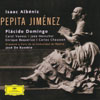Albeniz Pepita Jiménez
Mangled English with Spanish music: Domingo graces this operatic oddity
View record and artist detailsRecord and Artist Details
Composer or Director: Isaac Albéniz
Genre:
Opera
Label: Deutsche Grammophon
Magazine Review Date: 13/2006
Media Format: CD or Download
Media Runtime: 91
Mastering:
Stereo
DDD
Catalogue Number: 477 6234GH2

Tracks:
| Composition | Artist Credit |
|---|---|
| Pepita Jiménez |
Isaac Albéniz, Composer
Ángel Rodriguez, 2nd Officer, Baritone Carlos Chausson, Vicar, Bass Carol Vaness, Pepita Jiménez, Soprano Children's Chorus of the Madrid Comunity Enrique Baquerizo, Don Pedro de Vargas, Baritone Federico Gallar, 1st Officer, Tenor Federico Gallar, Count Genazahar, Baritone Isaac Albéniz, Composer Jane Henschel, Antoñona, Mezzo soprano José de Eusebio, Conductor Madrid Comunidad Chorus Madrid Comunidad Orchestra Plácido Domingo, Don Luis de Vargas, Tenor |
Author: John Steane
Than this more strange they scarce do come. That homely sentiment, with syntax influenced by the extraordinary English libretto, might be a natural first reaction to this otherwise very Spanish opera. Readers will not come to it utterly unprepared. Merlin and Henry Clifford have preceded it in the CD catalogues, both of them products of this collaboration between Albéniz and his English patron Francis Burdett Money-Coutts. Pepito Jiménez is based on a novel of provincial Spanish life by Juan Valera, more home-grown to Albéniz than to Money-Coutts who, it must be said, wrote a brand of English all his own irrespective of time or place.
The peculiarity of the English is not the only oddity. It seems that throughout the opera’s long-interrupted history it has been a matter of opinion as to whether the heroine lives or dies at the end, and whether, if living, she is united with young Don Luis in a conventional happy ending (and if so, is it truly happy, in that he will have had to renounce his intentions of entering the Church?). I think I know the answer to that one (the music tells us), but am puzzled by Act 1 ending with Luis going off to fight a duel of which nothing more appears to come in Act 2. There is also a musical anomaly: Act 1 is mostly loud and restless, Act 2 slower and more gentle. I much prefer Act 2.
The recording, like its predecessors, is conducted by José De Eusebio, to whom in large measure it owes its existence. He has edited the score, based on the revised version of 1905, nine years after the Barcelona premiere. As with Merlin, he has the support of Plácido Domingo, in fine voice and singing with conviction.
Carol Vaness no longer has the freshness or firmness of voice to do full justice to the heroine’s music but gives unstintingly and effectively. In the important role of the maid, Antoñona, Jane Henschel brings strong character and a sturdy voice. All have difficulty from time to time in getting their words across, partly because clear enunciation does not always ensure clarity, partly because the orchestra sometimes overwhelms. The “spectacularly beautiful and successful orchestration” is an aspect of the score which Eusebio has been most determined to demonstrate. He also claims “objective criteria and emotional sincerity”; to both of which, as Money-Coutts might put it, he shall have no gainsaying from me.
The peculiarity of the English is not the only oddity. It seems that throughout the opera’s long-interrupted history it has been a matter of opinion as to whether the heroine lives or dies at the end, and whether, if living, she is united with young Don Luis in a conventional happy ending (and if so, is it truly happy, in that he will have had to renounce his intentions of entering the Church?). I think I know the answer to that one (the music tells us), but am puzzled by Act 1 ending with Luis going off to fight a duel of which nothing more appears to come in Act 2. There is also a musical anomaly: Act 1 is mostly loud and restless, Act 2 slower and more gentle. I much prefer Act 2.
The recording, like its predecessors, is conducted by José De Eusebio, to whom in large measure it owes its existence. He has edited the score, based on the revised version of 1905, nine years after the Barcelona premiere. As with Merlin, he has the support of Plácido Domingo, in fine voice and singing with conviction.
Carol Vaness no longer has the freshness or firmness of voice to do full justice to the heroine’s music but gives unstintingly and effectively. In the important role of the maid, Antoñona, Jane Henschel brings strong character and a sturdy voice. All have difficulty from time to time in getting their words across, partly because clear enunciation does not always ensure clarity, partly because the orchestra sometimes overwhelms. The “spectacularly beautiful and successful orchestration” is an aspect of the score which Eusebio has been most determined to demonstrate. He also claims “objective criteria and emotional sincerity”; to both of which, as Money-Coutts might put it, he shall have no gainsaying from me.
Discover the world's largest classical music catalogue with Presto Music.

Gramophone Digital Club
- Digital Edition
- Digital Archive
- Reviews Database
- Full website access
From £8.75 / month
Subscribe
Gramophone Full Club
- Print Edition
- Digital Edition
- Digital Archive
- Reviews Database
- Full website access
From £11.00 / month
Subscribe
If you are a library, university or other organisation that would be interested in an institutional subscription to Gramophone please click here for further information.




